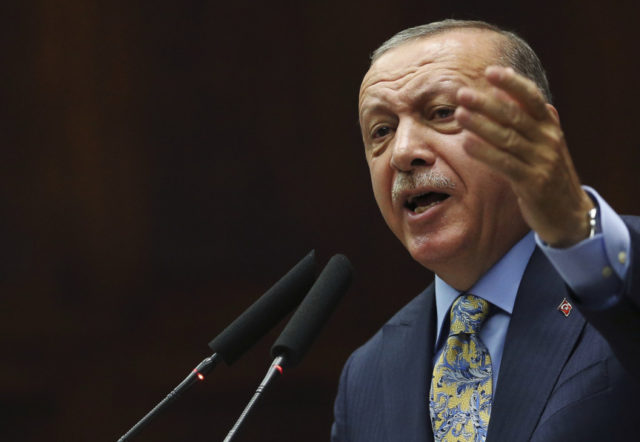Turkish President Recep Tayyip Erdogan renewed his call Wednesday for reforming the United States Security Council and ending permanent membership, emboldened by his heightened international status following the killing of Saudi journalist Jamal Khashoggi.
While Erdogan has demanded for years an end to permanent Security Council membership, urging instead a system that empowers developing nations to participate in Security Council decisions, his remarks Wednesday follow a week in which an international poll declared him the world’s most influential Muslim and his law enforcement and intelligence units pressured Saudi Arabia to admit that the missing Khashoggi was killed in a fight in their consulate in Istanbul.
Khashoggi, who wrote for the Washington Post, was a critic of Crown Prince Mohammed bin Salman and supporter of political Islam. Turkish media outlets favorable to Erdogan have argued that Khashoggi was especially important to Turkey because he was engaged to marry a Turkish woman and had at least one Turkish relative, grandfather Muhammed Halit Kasikci.
Erdogan declared on Tuesday, citing Turkish intelligence, that the Saudi version of events in the Khashoggi case was a lie, and that his death was a “premeditated” murder. On Thursday, the Saudi public prosecutor came to the same conclusion.
Erdogan observed the 73rd anniversary of the founding of the U.N. with a statement condemning the organization for being unequipped to face modern-day challenges. According to translated quotes in the pro-Erdogan newspaper Yeni Safak, the president insisted that reforms to the entire international body “cannot be delayed or ignored.” Erdogan listed a series of genocides, ethnic cleansings, and other disasters as proof of the United Nations’ inaction and specifically targeted the Security Council.
“The Security Council has failed to fulfill its responsibilities. That is why we call for urgent reform,” Erdogan wrote. “As long as the current injustice at the UN Security Council is not fixed, will it be possible to establish world peace and to achieve complete UN reform successfully?”
Erdogan concluded by noting that his government hopes to see Istanbul become a “U.N. center” and Turkey generally take on greater roles “in many activities such as peacekeeping operations, counter-terrorism, humanitarian and development assistance, migration and refugees.”
The remarks were not dissimilar to Erdogan’s speech at the U.N. General Assembly in September, in which he expressed profound disappointment with the organization’s inaction and the exclusion of country’s like Turkey from permanent roles at the Security Council.
“The massacres in Bosnia, Rwanda, Somalia, recently in Myanmar, and in Palestine as we speak, have all taken place before the eyes of the Security Council,” Erdogan said at the time. “When we say ‘the world is greater than five,’ we are becoming the voice of the common conscience, of the whole human race.”
Erdogan adopted the motto “the world is bigger than five” – referring to the five permanent member states of the Security Council – years ago as a call for greater Turkish influence on the world stage. Under his leadership, Erdogan has proposed larger and more influential roles for Turkey internationally, from promoting trade deals binding Turkey to Africa to becoming one of the most prominent supporters of Venezuelan dictator Nicolás Maduro.
On Monday, the Jordan-based Royal Islamic Strategic Studies Centre ranked Erdogan the world’s most influential Muslim, despite his lack of clerical background. According to Turkey’s state news agency Anadolu, the center noted that Erdogan had allegedly helped Turkey see “unprecedented economic growth, constitutional reform, and a re-emergence as a major global power.” The award did not mention the nosedive the Turkish economy took this year over the detention of American pastor Andrew Brunson or the popular resistance to the “constitutional reforms” that granted Erdogan unprecedented power in the Republican era of Turkey.
His influence in the Muslim world has grown rapidly in the past week however with Ankara’s handling of the Khashoggi case, largely at the expense of Saudi Arabia. Anonymous Turkish government sources spent most of the month leaking increasingly lurid details about the Khashoggi investigation to Turkish and international media, claiming that Saudi officials brutally tortured Khashoggi before his death. Saudi Arabia initially denied all reports but has since admitted that Khashoggi was killed by Saudi officials.
On Wednesday, Erdogan announced that it was “clear” to him “that this savage murder did not happen instantly but was planned.” Erdogan advisers and journalists supportive of the president have directly accused Crown Prince Mohammed bin Salman of ordering the killing.

COMMENTS
Please let us know if you're having issues with commenting.